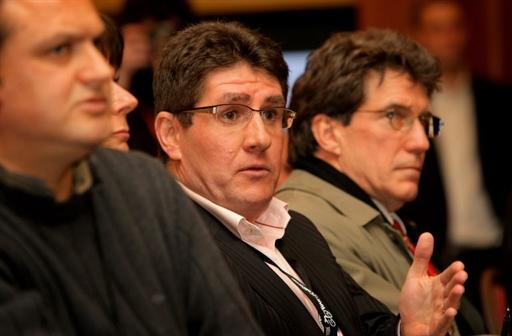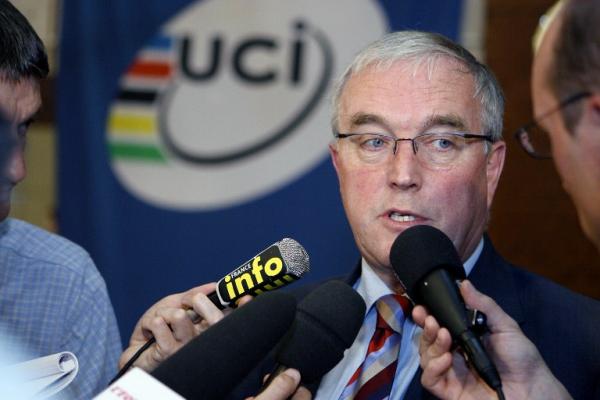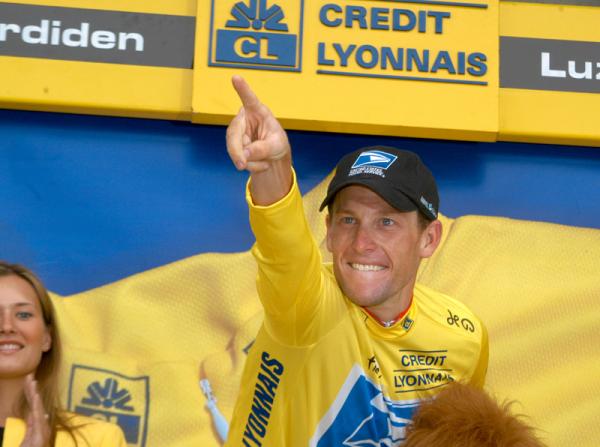Kimmage: UCI needs root and branch surgery
Rough Ride author on cycling’s future in the wake of Armstrong case



Even now, Lance Armstrong probably still thinks it was all about him. In declining to contest the US Anti-Doping Agency’s charges of doping and conspiracy on Thursday, Armstrong decried the process as an “unconstitutional witch hunt,” continuing with the same rhetoric that has seen him spend the past thirteen years branding his accusers as trolls.
Such delusions may satisfy Armstrong’s ego and his self-perpetuating sense of martyrdom, and it may even inspire his biographer to pen a risible attack on USADA for the Washington Post, but he may be disappointed to find in the weeks and months to come that the so-called trolls always had bigger, over-arching targets in mind.
Author of the seminal Rough Ride, the former professional rider and journalist Paul Kimmage was a man in demand over the weekend, as radio station after radio station sought the opinion of one of Armstrong’s most forthright critics during his years of excess. But time and again, Kimmage looked to move the discussion forward from the fallen Armstrong to an assessment of the rotten system that allowed him to prosper. “This couldn’t have happened in a vacuum,” he stressed.
A little under a century ago, a fellow Dubliner wrote that “History is a nightmare from which I am trying to awake,” and Kimmage can surely identify with the sentiment. USADA’s Armstrong case may feel like a seminal moment, but after would-be watersheds like Festina (1998), San Remo (2001), Puerto (2006) and Rasmussen (2007) failed to bring about any tangible change, it’s not easy to be optimistic.
“Nothing has changed. Another cheat has been confined to history but in terms of the future of the sport, it means absolutely nothing unless there’s some form of accountability here and someone is held to account for how this happened,” Kimmage tells Cyclingnews.
Rough Ride, though a poignant human story in its own right, is also a detailed invective beseeching cycling’s governing body to take decisive action against doping in the sport. When Kimmage wrote the book in 1990, Hein Verbruggen was president of the UCI. In 2012, Verbruggen’s acolyte Pat McQuaid performs the ceremonial duties. In the intervening period, blood doping spread through the professional peloton like wildfire, but at the top table, things have remained largely unchanged.
“It needs root and branch surgery,” Kimmage says of the UCI. “Hopefully if there’s one positive to come out of this Armstrong thing it’s that there’ll be some accountability and changes at the top. McQuaid needs to resign and Verbruggen needs to be removed from the sport. Until that happens, until there’s someone put in there who takes a look at the sport from top to bottom and just literally has an absolute clean out, then nothing will change.
The latest race content, interviews, features, reviews and expert buying guides, direct to your inbox!
“It will have to be radical and the bottom line is this – unless riders believe that the rules apply to everybody, that doping will not be tolerated in any form and speaking out against doping does not come with a penalty, then there’s no way you can change.”
If Kimmage has one nagging regret about Armstrong’s decision not to contest the USADA charges, it’s that some of the evidence accumulated might not now make its way into the public domain and so it may prove difficult to truly assess the level to which the UCI was complicit in the American’s story. Nonetheless, he feels that the UCI’s heavy-handed attempts to seize jurisdiction of the Armstrong case from USADA in the past month were a stark indictment of its mindset over the past decade and beyond.
“Even by their own miserable standards, the UCI have absolutely disgraced themselves this last month – they had that statement from McQuaid during the Tour saying that they were going to leave it totally up to USADA and then the very next day they’re sending off letters trying to wrest jurisdiction of the process,” Kimmage says. “I mean, my God, come on! Come on!”
Earlier this year, the UCI moved to sue Kimmage for defamation, in response to an interview with Floyd Landis first published in the Sunday Times in January 2011, where Landis detailed the intimidation he suffered at the hands of the UCI and alleged the body’s collusion in covering up an Armstrong positive test in 2001. Kimmage subsequently published the full transcript of the seven hour-long interview on nyvelocity.com and believes there is no better account of the sport’s problems than Landis’ own words.
“There have been so many questions about what’s going on now, but I’d really go back to that interview I did with Floyd,” he says. “If you read that transcript, you understand why the sport is in the mess it’s in now. It opened my eyes to it. It gave me a deeper understanding of what had happened from the time that I had spent out of it and that basically nothing had changed. The truth is in there, and the way out of it is in that interview that Floyd gave. All of the problems are there.”
Clean out
The solution for Kimmage would be to weed out the nefarious figures from all levels of the sport, the kind of independent audit that he freely admits “is pie in the sky because the UCI seem to be accountable to nobody. I mean, God knows what they’re going to do with this Armstrong thing and the stripping of the titles.”
Even so, in an ideal world, Kimmage has firm ideas on who he would expel from the sport and who he would like to continue trying to move cycling in the right direction. After spending the 2008 Tour de France embedded with the Garmin team, Kimmage has been a firm supporter of Jonathan Vaughters’ project, which features figures who themselves raced and doped at US Postal.
“Vaughters and the Garmin team have been caught up in this before and doped themselves but they have really shown a great attitude in terms of taking the sport forward and learning from those lessons,” Kimmage says.
And yet in the past two years, Vaughters has also contributed to one of the more discouraging examples of cycling’s failure to awake from the nightmares of its past. In seeking to form a breakaway league operating outside the UCI’s sphere, Vaughters aligned himself with his former US Postal manager Johan Bruyneel, even while the federal investigator Jeff Novitzky and later USADA were amassing evidence on his activities.
“I agree with you,” Kimmage concedes. “I’ve singled Vaughters out as someone I would keep in the sport but I do have reservations about him. I had reservations about him hiring [Thomas] Dekker, I had reservations about him trying to hire Contador. I thought that was the wrong thing to do.
“But on the whole, I think he has been very positive for the sport and I think were he not working within the constraints of the governing body as it is now under McQuaid and Verbruggen, we could see some real difference there. But I agree, if he was talking about this breakaway league and associating with Bruyneel, that’s a serious black mark against him in my view, definitely.”
ASO
The UCI, of course, are not the sole powerbrokers in the sport. Amaury Sport Organisation [ASO] owns cycling’s golden goose, the Tour de France, but little comment has emanated from Issy-les-Moulineaux in recent days. It wasn’t always thus – in the interregnum between Armstrong’s retirement in 2005 and his comeback in 2009, the ASO took an aggressive stance in its dealings with the UCI.
One product of the stand-off with the UCI was that the French Anti-Doping Agency (AFLD) carried out a hugely successful targeted testing programme at the 2008 Tour, with Riccardo Riccò, Bernhard Kohl and Stefan Schumacher among those to fall foul of a new test for CERA. That autumn, however, Armstrong announced his return to cycling: within weeks, progressive ASO president Patrice Clerc had been removed from his post and a rapprochement between the UCI and the ASO began in earnest.
“One of the most devastating things that happened for me was when they welcomed Armstrong back with open arms in 2009 – talk about raising the white flag on doping and any respect for the race,” Kimmage says sadly. “Well, to welcome him back with open arms, knowing that he had cheated told me a lot about where they were going.
“I remember how animated and upset Patrice Clerc was in Pau in 2007 when Vinokourov tested positive. That was in the day when the ASO called press conferences and told journalists, ‘this is what is happening, we’re not happy with the UCI.’ I remember that being quite impressive and really having a sense that they were deeply upset at how doping was destroying their race, but I’ve had no sense of that since then. So that’s very discouraging.”
Omerta
One of the key problems Kimmage identified in Rough Ride was the culture of silence, the omerta that surrounded cycling’s doping problem. Twenty-two years on, it seems that little has changed. At the time of writing, the highest-ranked to openly applaud USADA’s work has been Gustav Erik Larsson of Vacansoleil-DCM. The Swede lies 156th in the WorldTour standings.
“Obviously, you’ve got cranks like me ranting and railing over the past couple of days but in terms of the riders who are leaders of the sport – the Bradley Wiggins, the Froomes, the Contadors – has there been one strong, coherent statement about this?” Kimmage asks. “Has there been one positive statement where somebody actually applauds an anti-doping agency for doing its work, for exposing a cheat? Has there been any statement from any of these guys about this? Not one.
“What does that tell you? What it tells me is that omerta, the problem that existed in my time when I left the sport in 1989 is still there. For me, it’s not reflective of the fact that these guys are all cheating, even if you could be forgiven for assuming that. My own belief is that the real problem is the fear of speaking out. When there are repercussions for speaking out against doping, it means that nothing has changed. Nothing has changed. For me that’s the real problem there.”
While pressure from the sport’s top table may contribute to the silence – “If you speak out against it, you are deemed to be critical of the leaders and your punishment can come in many shapes and many forms” – Kimmage notes that everyone involved in cycling has a responsibility to facilitate the breaking of the omerta. In particular, the onus is on the media to be more courageous in its approach.
Reminded of Sky’s first rest day press conference at this year’s Tour, when reporters were curtly informed that doping questions would be cut off immediately, Kimmage maintains that journalists present in such situations have no excuses.
“This is your problem. This is where the journalists are complicit in what happens,” he says. “When they come in and say that ‘we’re not talking about doping’ it’s paramount that every journalist in that room gets up and walks out and says ‘we’re not talking to you. If you’re not interested in treating us like journalists, then we’re not going to talk to you.’”
On that point, Kimmage notes that the media has failed to hold Sky to account for the hiring of former Rabobank doctor Gert Leinders, who worked at Rabobank in a period when doping was tolerated on the team, thus rowing back on its original commitment to employ only doctors from the United Kingdom with no previous connection to professional cycling.
“Has nobody gone back to Brailsford about this investigation into Leinders? What’s happened to that?” Kimmage asked. “Is Brailford too busy now teaching Philip Hindes to fall off his bike properly? Is that what he’s been up to?”
Lessons from history
Those seven Tour wins may not ultimately be airbrushed from the record books, and regardless, Lance Armstrong will never lose an entrenched constituency of believers, but for Kimmage, the key point is that cycling – finally – learns from the mistakes of its past. The environment in which Armstrong thrived needs to be cleaned out.
Yet for now, the lie of the land remains strikingly similar to how it appeared in 1999. Back then, the UCI, ASO and large swathes of the press were lauding Armstrong as the saviour of cycling as he opened up the hitherto largely untapped American market.
Fast forward thirteen years and Bradley Wiggins’ Tour victory is bringing cycling centre stage in another new market, Great Britain. The general euphoria was summed up by a British tabloid printing cut-out Wiggins sideburns for fans to wear on the roadside, but on the eve of the Olympics, McQuaid himself went so far as to tell The Associated Press that he was hoping for more British success at the Games.
“It would be great if it happened because it's another edition to this fairy-tale story," McQuaid said. "It would be great for cycling and great for the Olympic Games."
On its launch in 2010, Sky was widely lauded for its proudly stated commitment to clean cycling, but in spite of its current status as the sport’s flagship team, Sky has shown no willingness to break the pervasive silence on the Armstrong affair and its possible repercussions for the future governance of cycling.
“Let’s make no bones about it – this Wiggins victory is huge for the UCI,” Kimmage says. “Britain is a big market with bike sales going through the roof, massive interest there. It’s Big Pat’s back garden and he’s very obviously thrilled by it because every time you look at him, he’s got his arm around Brailsford. So is it a coincidence that something like this happens and we don’t hear a word from any of them? Not Brailsford, not Wiggins, not any of them.
“Is that a coincidence? Because that will upset Pat and we can’t upset Pat. Brailsford understands how the system works and every decision he makes is based upon ‘what does the UCI want? What does McQuaid want me to do here?’”
In an opinion piece on the Armstrong case for the Observer on Sunday, Kimmage asked, “Do we have any reason to believe that the people running the sport really want to fix it?” [http://www.guardian.co.uk/commentisfree/2012/aug/26/cycling-clean-up?newsfeed=true]
Twenty-two years after first asking the question, Kimmage can be forgiven for not holding his breath on a straight answer at this point.

Barry Ryan was Head of Features at Cyclingnews. He has covered professional cycling since 2010, reporting from the Tour de France, Giro d’Italia and events from Argentina to Japan. His writing has appeared in The Independent, Procycling and Cycling Plus. He is the author of The Ascent: Sean Kelly, Stephen Roche and the Rise of Irish Cycling’s Golden Generation, published by Gill Books.